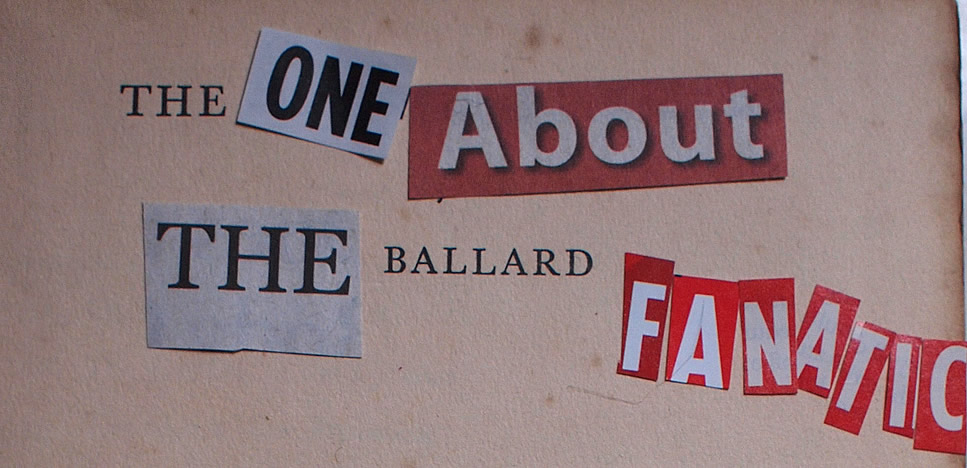
The One About the Ballard Fanatic
Apr 26, 2015The One About the Ballard Fanatic
Later, as blood thickens on the woven jute rug in Gennison’s study, I wonder how we got on to Ballard in the first place.
I was nursing a pint of stout at a pub in Hampstead. Behind the bar, bottles glittered like gaudy cathedral saints in a common alcove; above them, a bank of silent televisions, each tuned to a different satellite news channel. The Secretary-General of the UN kept popping up as though he were trying to coax me into a game of peek-a-boo. I didn’t want to play, and I returned my attention to the rapture of beige bubbles ascending the sides of my glass.
Then someone a few seats to my right snorted and mumbled “Jackpot.” I glanced over to see a middle aged man tucking into a basket of chips. He sensed my attention and nodded towards the televisions.
The news cycles had briefly synchronized. All six screens were showing identical footage of a helicopter hovering over a bulbous water tank on rickety stilts, rising a hundred feet from a drab prairie that might have been Kansas or Kazakhstan. Dangling at the end of a thread extruded from the chopper’s belly was a tiny knot of flailing limbs. Zoom: a geared-up trooper holding the boy he’d just plucked to safety. America then. They’re the sort that care.
The barkeep was watching too.
“He’s right, luv,” I said to her. “It’s come up all helis.” I pushed my glass forward. “Pay out.”
“Fat chance,” she said, and stalked to the other end of the bar.
The fellow and I exchanged a wry glance, and then we both watched the stations slide out of synch, their momentary convergence as transient as the fleeting communion he and I had just shared.
*
When I regain consciousness, I’m aware of nothing but a repetitive thud in my left ear, drumming out through an oceanic swirl of white noise. Fastening on to the muffled beat, I realize that it’s my own pulse, and around this single clue the order of things resolves. I’m lying on my side; I’m thinking about a JG Ballard story called “Track 12,” in which a man dies to the susurrations of his own grossly amplified kiss, and from this stubborn thought I grope my way back: to the pub, to the screens, to Ballard. To Gennison. I’m lying on the floor of his study.
You might think my next question would be “How did I get here?” But I remember perfectly well how I got here. The barkeep rang last call and Gennison suggested a nightcap at his place. “Just around the corner, right on the square,” he said. “Show you my Ballard firsts while we’re at it,” he added with a self-deprecating roll of his eyes.
I take in a deep, shuddering breath and open my eyes. I make out the black and white pattern of the rug. About a yard away this pattern vanishes beneath a coagulating pool of black-red blood, which I stare at for a short eternity, until I’m certain its tide is not advancing. I dare not wonder whether the blood is mine, not yet. A few sheets of paper are stuck to the surface of the pool.
I try to remember when I had the first intimation that Gennison was mad. But my thoughts won’t stick, and the question persists: how on earth did we get on to Ballard? Surely none of this would have happened if we hadn’t.
*
If you love to read, favourite books and authors are at the back of every conversation, waiting for their cue, the slightest pretext to join the fray. Many of my youthful friendships—courtships too—only gained altitude when one of us artlessly guided the chatter to a writer or title we loved. Much later, in the general shakedown that is middle age, one looks at the friendships and relationships thus forged and questions, at last, the accuracy of literary taste as a predictor of like-mindedness.
Perhaps the question is moot. Gennison was a fanatic. He no doubt had a thousand different strategies for slipping Ballard in. Turning conversations to Ballard was the man’s specialty, perhaps his raison d’etre. He could probably do it in such a way that left you thinking you were the one who’d done it.
Still, memory insists on churning over the evening for a clue. One minute I was nursing my drink, the next I was smiling faintly as my neighbour at the bar merrily jabbered on about JG Ballard.
Gennison was roughly my age, 45, a balding chap with watery eyes, round cheeks and a bushy moustache. He wore a tan trench coat over a dark brown suit that was fraying at the cuffs and bronze at the knee, like a statue rubbed for good luck by generations of passers-by. I would have guessed he was a salesman, an area rep for a pharmaceuticals firm perhaps. It turned out his game was civil engineering.
I laughed when he told me this. “You’ve got me there.”
His eyes showed confusion. But he was eager to avoid giving any hint of offense and he quickly shaped his lips into a weak smile. “Er, not sure I follow,” he apologized.
“Your profession. It’s the profession of an archetypal Ballard character,” I said, faintly impatient. “I’d have to be a psychiatrist to trump you.”
“Yes, now that you mention it there are rather a lot of them in his stories, aren’t there?” He forced a laugh, and then fell silent. “So good to meet a fellow enthusiast,” he sighed into the conversational pause.
I make no apologies for being proprietorial, as I’m of that very small cadre of readers who’ve actually suffered for Ballard. As a spotty teen back in the seventies heyday of British fandom I bore the brunt of some cheap shots from the spaceships and robots crowd, who ran Jim down at every opportunity. Well of course no sooner had the literary world begrudged him a measure of respect than the bifurcated penis crowd came along to claim him as one of their own.
Gennison claimed to have fought the good fight too, but as our conversation ran on I began to suspect he was a latecomer. For one who, moments before, had been crowing on about surgical precision in prose, he showed a damnable imprecision about short story titles: it was “the one about the dying astronaut” or “that one with the family members who kill each other when they finally meet in person.” I’m not petty about these things in small doses but after the fourth or fifth time my irritation surfaced.
“Another classic is the one about the motorway,” I said.
“But... but that could be any of them. Oh, I see!” He laughed at what he took to be a joke, as fearful of taking offense as he was of giving it.
*
I lie on the floor in Gennison’s study, listening intently to the silence of his house. Somewhere a spring-driven mantle clock whirrs like frantic beetle trapped in glass and rings out the hour.
Midnight. Only midnight. Whatever madness erupted forth was cataclysmic, immediate, and, to gauge from the silence in the house, conclusive. Where is Gennison?
To keep reading, buy the print edition of David Hull's novella The Man Who Remembered the Moon, to be published on Sept 27 2015.

